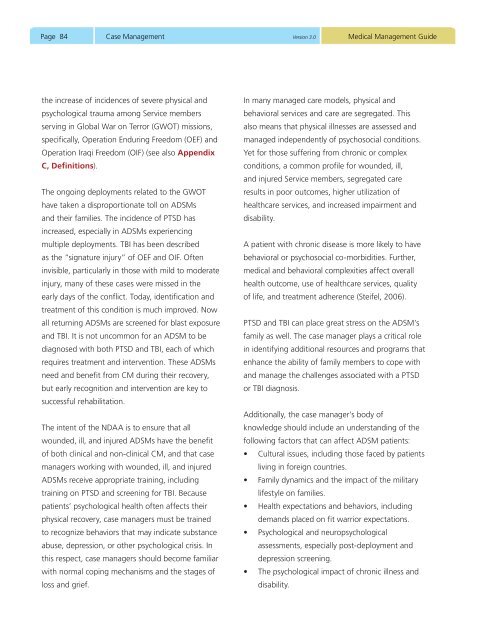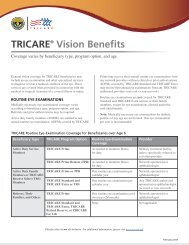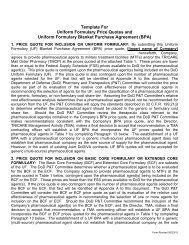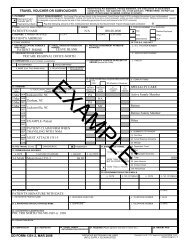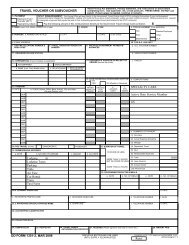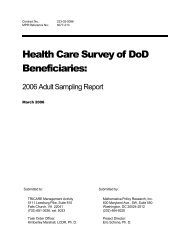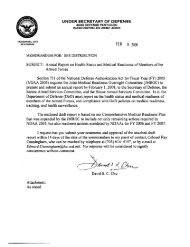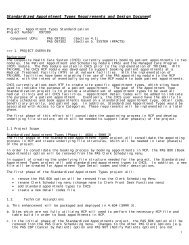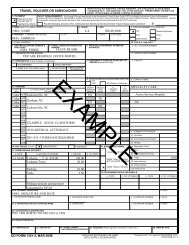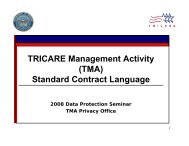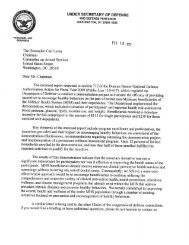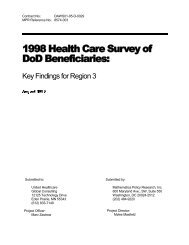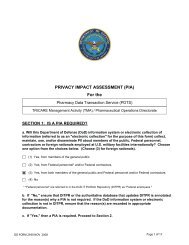Medical Management Guide, 2009, Version 3.0 - Tricare
Medical Management Guide, 2009, Version 3.0 - Tricare
Medical Management Guide, 2009, Version 3.0 - Tricare
- No tags were found...
You also want an ePaper? Increase the reach of your titles
YUMPU automatically turns print PDFs into web optimized ePapers that Google loves.
Page 84Case <strong>Management</strong> <strong>Version</strong> <strong>3.0</strong><strong>Medical</strong> <strong>Management</strong> <strong>Guide</strong>the increase of incidences of severe physical andpsychological trauma among Service membersserving in Global War on Terror (GWOT) missions,specifically, Operation Enduring Freedom (OEF) andOperation Iraqi Freedom (OIF) (see also AppendixC, Definitions).The ongoing deployments related to the GWOThave taken a disproportionate toll on ADSMsand their families. The incidence of PTSD hasincreased, especially in ADSMs experiencingmultiple deployments. TBI has been describedas the “signature injury” of OEF and OIF. Ofteninvisible, particularly in those with mild to moderateinjury, many of these cases were missed in theearly days of the conflict. Today, identification andtreatment of this condition is much improved. Nowall returning ADSMs are screened for blast exposureand TBI. It is not uncommon for an ADSM to bediagnosed with both PTSD and TBI, each of whichrequires treatment and intervention. These ADSMsneed and benefit from CM during their recovery,but early recognition and intervention are key tosuccessful rehabilitation.The intent of the NDAA is to ensure that allwounded, ill, and injured ADSMs have the benefitof both clinical and non-clinical CM, and that casemanagers working with wounded, ill, and injuredADSMs receive appropriate training, includingtraining on PTSD and screening for TBI. Becausepatients’ psychological health often affects theirphysical recovery, case managers must be trainedto recognize behaviors that may indicate substanceabuse, depression, or other psychological crisis. Inthis respect, case managers should become familiarwith normal coping mechanisms and the stages ofloss and grief.In many managed care models, physical andbehavioral services and care are segregated. Thisalso means that physical illnesses are assessed andmanaged independently of psychosocial conditions.Yet for those suffering from chronic or complexconditions, a common profile for wounded, ill,and injured Service members, segregated careresults in poor outcomes, higher utilization ofhealthcare services, and increased impairment anddisability.A patient with chronic disease is more likely to havebehavioral or psychosocial co-morbidities. Further,medical and behavioral complexities affect overallhealth outcome, use of healthcare services, qualityof life, and treatment adherence (Steifel, 2006).PTSD and TBI can place great stress on the ADSM’sfamily as well. The case manager plays a critical rolein identifying additional resources and programs thatenhance the ability of family members to cope withand manage the challenges associated with a PTSDor TBI diagnosis.Additionally, the case manager’s body ofknowledge should include an understanding of thefollowing factors that can affect ADSM patients:• Cultural issues, including those faced by patientsliving in foreign countries.• Family dynamics and the impact of the militarylifestyle on families.• Health expectations and behaviors, includingdemands placed on fit warrior expectations.• Psychological and neuropsychologicalassessments, especially post-deployment anddepression screening.• The psychological impact of chronic illness anddisability.


